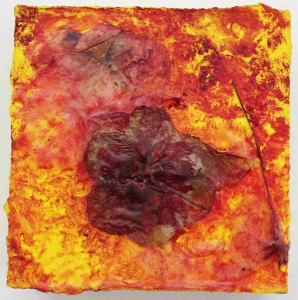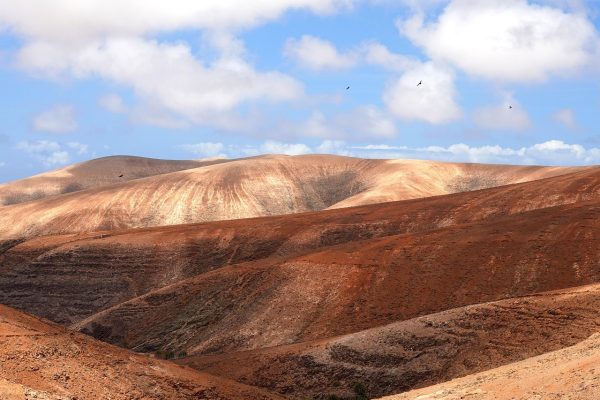Despite being an avid participant in Jewish ritual, I have always had a hard time getting myself to count the Omer. I tried a variety of self-motivating and self-castigating tricks for three and a half decades, but Sefirat HaOmer suffered passive neglect as well as active resistance in my spiritual house.
Then, recently, something shifted. First, I wrote the poem (below): “Counting on the Covenant.” Then, I created a necklace and earrings (pictured below) as my Sefirat HaOmer counting tool. The necklace has 49 beads, with the first of every seven beads being a ruby. The ruby signals the first day of each week’s counting, the day in which an attribute is doubled (ex., Hesed she’b’hesed – lovingkindness of lovingkindness). The last ruby bead, from either direction, is for Shavuot. The earrings echo the necklace but each culminates in a faceted quartz crystal. I don’t have keen enough eyesight to count all the facets on them. However, I am reminded of the midrashic tradition that asserts that there are seventy faces of the one, unified Torah (Bamidbar Rabbah 13), which is revealed at Sinai. This Sefirat HaOmer tool echoes the understanding in Sefer Ha-Hinukh: “we always make what is secondary into a sign for what is the essence.”1
Tiferet, the sixth sefirah in the kabbalistic Tree of Life, has the common association of “Spirituality,” “Balance,” “Integration,” and “Beauty.” Playing with color, order, stones, movement – making jewelry – is one way that I connect with Tiferet, תפארת. Before I found this Tiferet way to help myself count the Omer, I relied on more obvious forms of Gevurah: boundary, will, judgment. But, ultimately, Gevurah alone could not create change. Gevurah is not always sustained by discipline alone. Sometimes Tiferet, beauty and balance, can draw one toward Gevurah. Today, we look to the strength that can be manifested within beauty, Gevurah she’b’Tiferet.
Counting On the Covenant
Every year,
halfway through Sefirat HaOmer,
I vow to count the Omer next year.
It is already half over,
so why start now?
It seems unkosher.
There is no principle in this matter,
just a feeling that if I can’t count the whole thing
it isn’t good enough.
Yet, when I find myself halfway through a meal
having not said a brakhah,
I always stop to say one.
I figure that awareness of gratitude halfway through my meal is better than
awareness of gratitude for none of my meal.
Perhaps the problem is with the counting itself.
Yet I have counted
the footsteps taken in a day,
the difference in minutes between taking this route or that route,
the numbers of times I chew my food,
the thousands of dollars’ difference between adopting a child from this country rather than that country
and now platelets and red and white blood cells.
I have counted
the seconds until a mammogram is over,
the breaths between contractions,
the eighteen, no nineteen, blessings of the Amidah – so many words,
the number of blocks that I can run
before I need to pee.
Like any good product of her capitalist milieu,
I quantify
and then qualify
most every aspect of my life
and of the world.
Yet, I have never tried to count the stars
or the grains of sand on the beach.2
The covenant I seek is uncountable:
I promise
to do what I need to do to be present enough
to witness the uncountable blessings
Even though, you, my dear God/world
cannot promise anything.
Image by D’vorah Horn from her set of Omer Practice Cards (2016).
Notes
1 Sefer Ha-Hinukh Mitzvah #306 (Book of Education, 13th century, Spain). “It is from the roots of the commandment from the angle of the simple understanding [that it is] since the entire essence of Israel is only the Torah, and because of the Torah were the heavens and earth created, and as it is stated (Jeremiah 33:25), ‘Were it not for my covenant day and night, etc.’ And it is the essence and the reason that they were redeemed and left from Egypt—in order that they receive the Torah at Sinai, and fulfill it. And [it is] like God said to Moshe (Exodus 3:12), ‘And this will be the sign for you that I have sent you; when you take out the people from Egypt, you shall worship God on this mountain.’ And the understanding of the verse is [that] your taking them out from Egypt is a sign for you that you shall worship God on this mountain—meaning that you shall receive the Torah, which is the great principle for which they were redeemed and it is their ultimate good. And it is a great matter for them, more than freedom from slavery. And hence God made a sign of their leaving Egypt for the receiving of the Torah; as we always make what is secondary into a sign for what is the essence.”
2 Genesis 22:17











